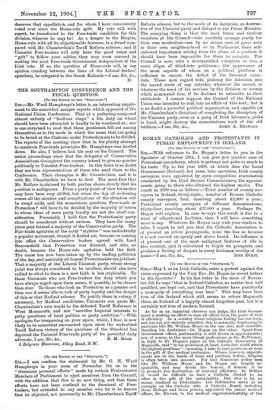SIR,—I can confirm the statement by Mr. G. H. Ward
Humphreys in your issue of November 5th as to the " strenuous personal efforts " made by certain Protectionist Members of Parliament to eject members from the Council, with the addition that this is no new thing, and that these efforts have not been confined to the dismissal of Free- traders, but extended to any member who let it be known that he objected, not necessarily to Mr. Chamberlain's Tariff Reform scheme, but to the mode of its inception, as destruc- tive of the Unionist party and disloyal to the Prime Minister. The annoying thing is that the most bitter and virulent members of the Council—who carefully arrange yearly for their own re-election—are by no means men of great note in their own neighbourhood or in Parliament, their self- endowed importance arising from the abuse of a position it should have been impossible for them to arrogate. The Council is now, with a distinguished exception or two, a mere clique of third-rate politicians, the appearance of the most capable of whom on a political platform is sufficient to ensure the defeat of the favoured canal- date. These men regard with jealousy the intrusion into the sacred circle of any outsider, whatever his record, or whatever the need of his services by the division or county which nominated him, if he declines to subscribe to their shibboleth. I cannot suppose the Council of the National Union was intended to sink into an affair of this sort ; but it is no doubt a powerful political organisation, and capable (at Mr. Chamberlain's dictation) of completing the disruption of the Unionist party, even as a gang of Irish labourers, picks in band, might destroy the conscientious work of the old builders.—I am, Sir, &c., JOHN A. BRIDGES.










































 Previous page
Previous page